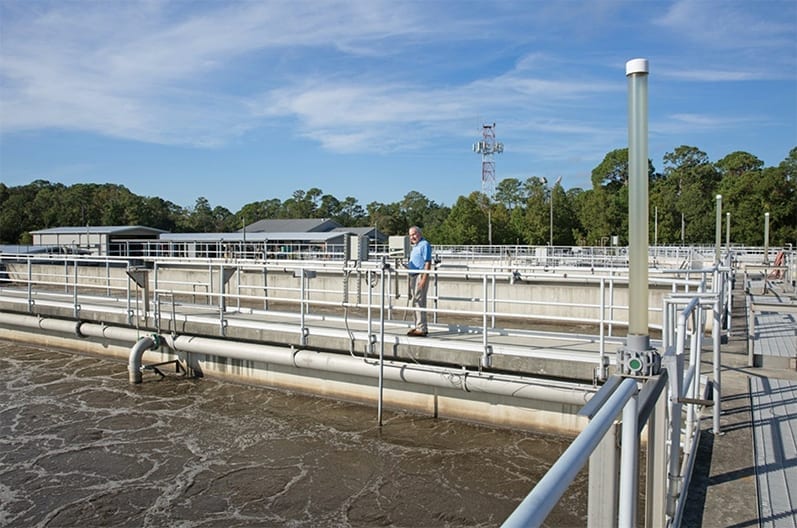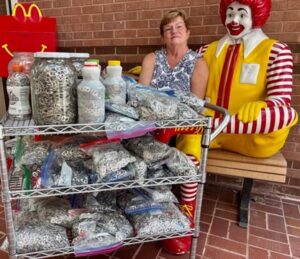Hilton Head PSD’s Recycled Water Supervisor featured in Treatment Plant Operator Magazine
At the ripe old age of 19, Bob Davis answered a help wanted newspaper ad from the International Paper research center in Tuxedo, New York.
An aptitude test showed Davis to be pretty smart, and in the early 1970s, the company started him out in a pilot plant, a scaled-down version of paper mill equipment found in the field. He moved on to a succession of roles with increasing responsibility in that industry before making a career change to the wastewater treatment profession in 2009. Today, he is the recycled water supervisor at the Hilton Head Public Service District in South Carolina.
There he supervises a recycled water facility that delivers irrigation water to golf courses on an island with a population that swells with tourists every summer.
Traveling technician
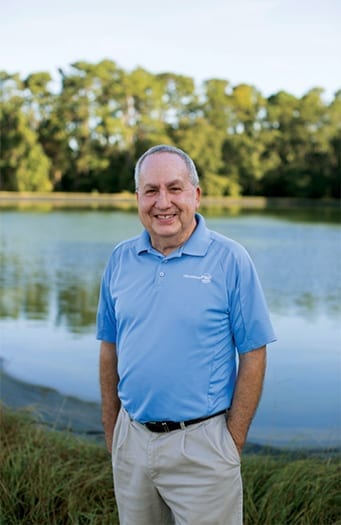
Davis’ paper industry career spanned 36 years. After his first job with International Paper, he became a field service technician on a crew that went to paper mills across the country to help with upgrades, equipment changes and startups. From 1973-90, he did process control testing and related work at mills in Arkansas, Texas, Louisiana, Oregon, New York, Maine and elsewhere.
But traveling and spending months at a time in hotels soon lost its appeal. On a trip to the International Paper mill in Georgetown, South Carolina, he asked the environmental superintendent to keep him in mind if he ever had an opening. One soon came up.
Davis began working in the lab at the Georgetown mill doing process control work, stack testing for air permit compliance and effluent testing at the mill’s 28 mgd wastewater treatment plant, a large aerated lagoon system with a primary clarifier and multiple lagoons.
While working in the lab from 1990-97, he passed the certification license exams, D through A, for South Carolina biological wastewater operators. Along the way, he has acquired almost every water and wastewater certification the state offers, including the highest certifications for water system operators in the state.
The Roman philosopher Seneca is said to have observed: “Luck is what happens when preparation meets opportunity.” For Davis, that happened in 1997 when the operator in charge of the wastewater treatment plant and his supervisor became ill and had to leave work.
“I had the training, licenses and experience, and I became the supervisor,” he says. He rose from lab technician to plant supervisor overnight because he had the A-level biological operator certification the state required for the position.
A role model
Education was a key to his progress. While living and working in New York, he started college at night, but his progress was unsteady. His frequent travels as a member of the field service team forced him to keep dropping courses.
After he moved to South Carolina and settled in, his wife, Susan, and father-in-law encouraged him to go back to college and complete his degree. Over the years, he earned his Associate of Science degree from Horry-Georgetown Technical College and his bachelor’s degree in biology from Coastal Carolina University, graduating in 2002.
“Going to school at night, you miss out on some family things,” he says, but the degree gave him opportunities he otherwise would not have had. “I became the wastewater supervisor because I had the A-level biological certification. After I finished my bachelor’s degree, I wound up becoming the lab supervisor and the solid waste/hazardous waste supervisor, as well as the wastewater supervisor. I got a lot more responsibility, and more compensation, by finishing my degree.”
He praised his wife for her support (their two children were small at the time) and his father-in-law for being a role model: “My father-in-law was born in the Bronx (New York). He went to Hunter College in the daytime and worked on the railroad at night. He went on to complete his master’s degree at Cornell.”
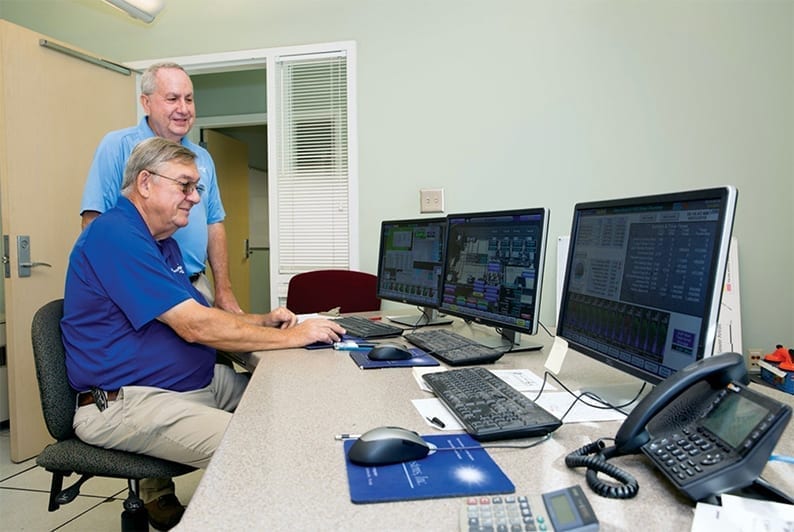
Second career
Davis retired from International Paper in 2009 and went to work for the Georgetown County Water and Sewer District, just north of the Georgetown International Paper Mill where he worked and about 35 miles south of Myrtle Beach.
He worked with the district until April 2016, when the opportunity at Hilton Head opened up. He has had a good run there. With 35 employees, the 20,000-customer utility provides water, sewer, wastewater treatment and recycled water service for the north and middle areas of Hilton Head Island, a popular resort destination.
The wastewater treatment plant is a 6.4 mgd (design) return activated sludge plant with deep-bed gravity filters for tertiary treatment. “In summer, we average treating about 3.5 mgd; and in winter, it’s about 2.5 mgd,” Davis says. The facility discharges nothing to bodies of water; all effluent is sold to golf courses for irrigation or used to nourish interior wetland habitats.
Coping with storms
The excess capacity and effluent storage facilities help the district cope with storms: Hilton Head is in the Atlantic hurricane zone, and the district is a first-responder agency for hurricanes. “We have a 2 million-gallon effluent storage tank at the plant, and behind the plant, there are three storage ponds totaling 20 million gallons,” Davis says. An additional 1 million-gallon storage tank is located at a country club golf course.
When Davis knows a storm is coming, he can reduce the inventory of treated wastewater in storage at the plant by sending it to the recycled water wetlands, or he can adjust the transfer rate so the treatment basins are holding less water as well. “When a storm is coming, we make sure we have room for the extra water,” Davis says.
Team members are able to bunk at the utility’s hurricane-hardened facility, which is built to withstand up to a Category 3 storm. The utility is closely linked to emergency management and other first-responder agencies. During Hurricane Matthew in October 2016, the staff stayed at the plant for several nights and then evacuated to a first-responder base camp on the mainland with police, firefighters, medical staff and other agencies. This approach allows the district to begin recovery quickly after a storm passes.
Small staff, big job
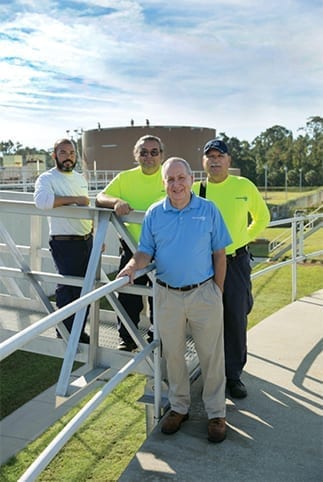
The recycled water plant is staffed during the day by three operators. At night, Bill Davis, the operations manager, can check things on his computer at home via a robust SCADA system. Bob Davis can check as well: “I can see the whole system on my computer. I can open and close valves, turn pumps on and off, and make other corrective changes.” Other plant team members include Daniel Schrock and Brian Fedorick, senior recycled water technician, and Victor Adams, recycled water technician.
As with many water and wastewater facilities across the U.S., training the next generation of plant operators is a focus. “We just hired four new, young guys in the last couple of months,” Davis says. “We started them off by learning the wastewater collections system, so they’re going out and learning about pumps, pipes and lift stations.”
The district operates a sanitary sewer system with more than 130 lift stations. On the drinking water side, the district sees an average daily demand of 6 mgd and summer peaks up to 11 mgd. Ten employees monitor and maintain that system, which includes a 4 mgd reverse osmosis plant that treats brackish groundwater.
Drinking water sources include fresh groundwater wells, water purchased wholesale from the mainland utility, and an aquifer storage and recovery facility tapped for high-demand periods.
The Hilton Head district has won South Carolina Department of Health and Environmental Control’s Facility Excellence awards for three consecutive years. Its wastewater treatment plant site has also been certified by Audubon International as an Audubon Cooperative Sanctuary Program.
In addition, the utility was named the 2018 Wastewater System of the Year by the South Carolina Rural Water Association. The award recognized the district for building two regional lift stations using South Carolina Clean Water Revolving Fund financing of $1.5 million for 20 years at 1.9%. That kept costs to customers low and added 9 miles of sewer mains under a partnership with the island’s municipal government
Complementing the recognition from the district, Davis’ professional colleagues honored him in 2019 with a Water Environment Federation William D. Hatfield Award. It recognizes outstanding performance and professionalism; it’s clear Davis has earned it.


